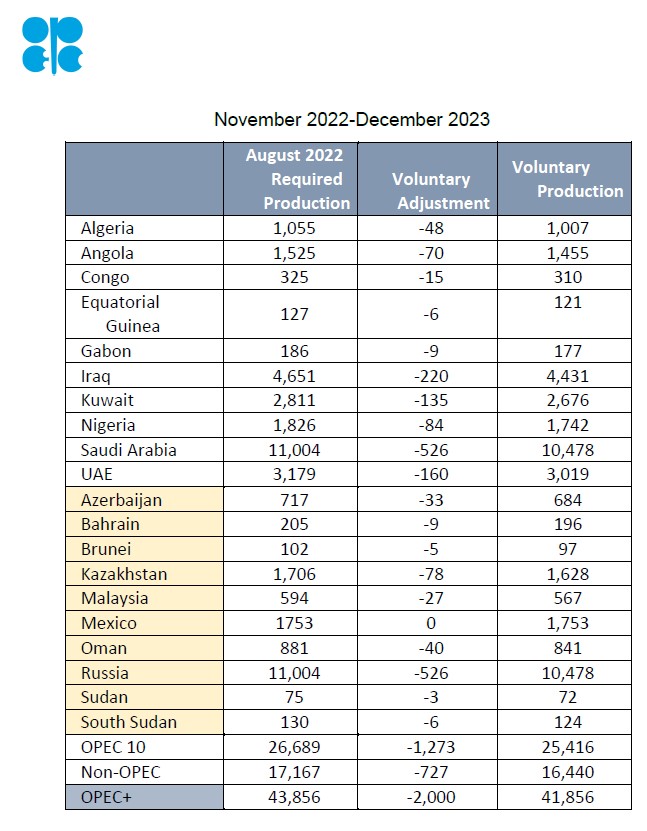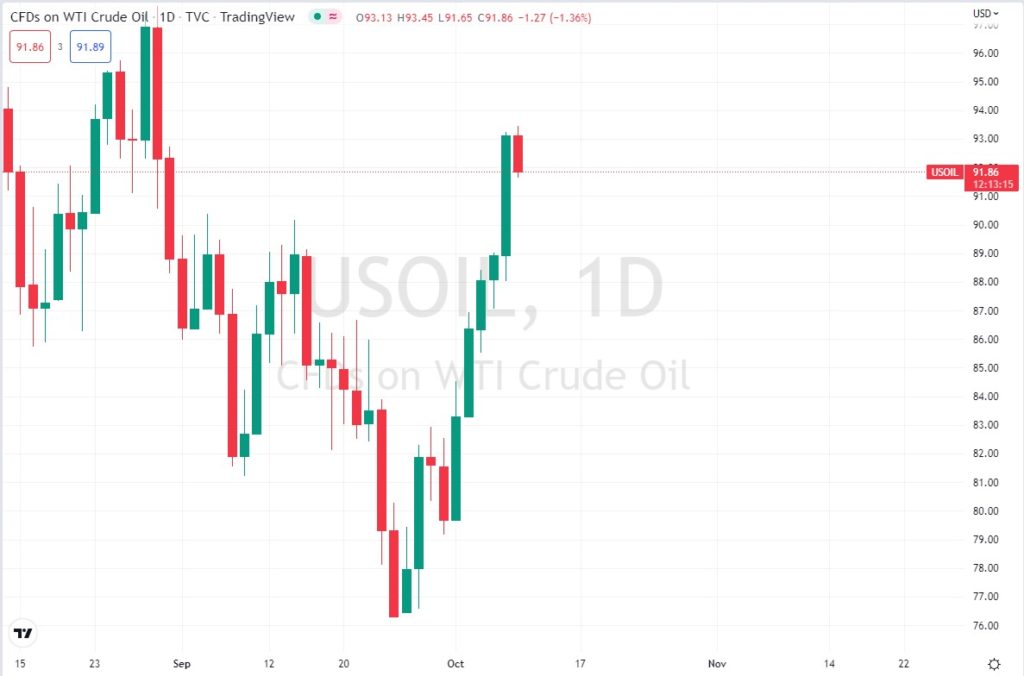OPEC News: What Oil Production Cuts Means for Investors
Disclosure: We are reader-supported. If you purchase from a link on our site, we may earn a commission. Learn more
Last Updated on: 11th October 2022, 04:02 pm
We’ve been hearing a lot of OPEC news recently, but what are the ramifications? OPEC+ had their scheduled meeting in Vienna, Austria on October 5th, 2022, to agree on production quotas. What impact will production cuts have?
We’ll get into the consequences of production quotas set by OPEC a bit further down. First, let’s see what the main highlights of the latest OPEC+ meeting are.
Table of Contents
OPEC News: Key Takeaways of Their Latest Meeting
The 45th meeting of the Joint Ministerial Monitoring Committee and the 33rd OPEC and Non-OPEC Ministerial meeting agreed on the following main lines of action:
- Overall production was cut by 2 million barrels per day as of November 2022 by all participating countries.
- The voluntary adjustment quota per country
- Extend the declaration of cooperation until December 2023
- Adjust the frequency of meetings to every two months, instead of monthly
- Schedule the next OPEC+ meeting for December 4, 2022

Consequences of OPEC Production Quotas
OPEC production quotas can influence the price of crude oil as we have seen various times in the past. So, what’s important in OPEC news is the agreement the club reaches on the size of the production quota.
This time around the consensus brought about a production cut of 2 million barrels per day. Despite previous concerns, the crude oil market saw this as more than sufficient to prop up the price of crude oil.
Before the announcement of the scheduled meeting, crude oil had drifted lower on rising concerns of an economic slowdown. On September 26, 2022, WTI crude oil touched a low of $76.26, after which rumors started circulating of production cuts at the forthcoming OPEC+ meeting.
Crude oil prices rallied the next day and WTI crude closed the week at $79.68 after touching $83 during the week. The following Monday, October 3, 2022, crude prices continued their rally and reached a recent high of $93.14 two days after the official announcement of production cuts.
It remains to be seen if crude oil prices can remain in a bull trend or even maintain current prices. Demand for crude oil will decrease if economic activity declines or worse stumbles into recession.
The chart below shows that WTI crude oil prices had been in free fall running up to the October meeting. Somehow, rumors always get through as to what the OPEC+ meeting is about to agree upon. And you can see how at the end of September crude oil prices start rising and continue beyond October 5.

Economic Consequences of OPEC Quotas
The immediately visible effect of the production cut is an increase in crude oil prices. And price increases directly impact energy stocks’ prices. The energy sector as a whole was up 3.7 percent over the week, while stocks like Exxon Mobil (NYSE: XOM), Chevron (NYSE: CVX), and Phillips 66 (NYSE: PSX) are gaining even more ground.
However, consumers in general won’t be so happy, as higher crude oil prices will bring higher gas prices also. If crude oil prices remain high or continue even higher, we may start seeing general energy costs rising and adding to inflation.
Transportation costs are an important factor when it comes to the final prices of goods when they reach the shops. The Wall Street Journal saw transportation costs up by 23 percent for 2021 and expects the trend to continue into 20222.
Higher crude oil prices can be assimilated when the economy is expanding, and real wages are rising offsetting higher prices. However, a shrinking economy will find higher energy and transportation costs a further drag on production and consumption.
It may create or worsen a scenario where we have high inflation and a recession, known as stagflation. High inflation in the absence of a booming economy will have a negative effect on the stock market for various reasons.
Without an increase in real wages consumer purchasing power is reduced and people spend less. The Federal Reserve raises interest rates, and the housing market is negatively impacted. Both work together to cause the economy to contract further.
Why Does OPEC News Impact Crude Oil Prices?
The answer to the above question is very easy. OPEC+ controls 80 percent of the world's crude oil reserves and approximately 75 percent of global production. Clearly, any move to constrain or increase supply has an impact on price.
This might not seem of any concern to investors but as we have seen above rising crude oil prices can prove detrimental to economic activities at certain times. And therefore, negatively impacting the stock market. Not to mention that we all feel the difference when we go to fill our cars’ gas tanks.
However, some assets are immune to the effects of crude oil prices. Looking at assets in the alternative investment space may be a way to diversify your portfolio. By doing so you limit your exposure to assets that are highly correlated to the returns of stocks.
Which Countries Make Up OPEC & OPEC+?
OPEC member countries:
- Algeria
- Angola
- Congo
- Equatorial Guinea
- Gabon
- Iran
- Iraq
- Kuwait
- Libya
- Nigeria
- Saudi Arabia
- United Arab Emirates
- Venezuela
Additional members of OPEC+:
- Oman
- Sudan
- Brunei
- Russia
- Mexico
- Bahrain
- Malaysia
- Azerbaijan
- Kazakhstan
- South Sudan
Brief History of OPEC
OPEC was established in Iraq, in September 1960. The founding members were:
- Saudi Arabia
- Iraq
- Iran
- Kuwait
- Venezuela
Since then, various crude oil-producing companies have joined the organization. The full list of current members is mentioned above. OPEC+ countries are not members of the organization but cooperate with OPEC to achieve common interest goals on production.
Some have also left, such as Qatar which joined in 1961 and suspended its membership in 2019. Ecuador also suspended its membership in 2020, having originally joined in 1973.
According to the OPEC Statute, their mission is to coordinate and unify the policies of petroleum-producing countries that are members of the organization. They seek to ensure price stability, economic, and regular supply to petroleum consumers, and a fair return on their capital to those investing in the industry.
Conclusion
It may prove hard to determine exactly how long the effects of a reduction in crude oil production will sustain or drive prices higher. How badly gas prices may be impacted also depends on domestic production.
However, we are experiencing a changing geopolitical landscape, supply constraints, and higher energy prices. Together with an economy that may be feeling the crippling effects of inflation. These factors do not bode well with volatile crude oil prices.
Investors can find refuge in physical assets like gold and silver that are known to be resistant to inflation and economic downturns. Holding a portion of your portfolio in gold and silver may be enough to limit the damage that these events can wreak havoc on traditional assets.
Bottom Line
Diversifying your portfolio is the best way to protect your investments from financial crises. Various factors can come into play, and at some point, stock market routs are inevitable it would seem. So, allocating some of your capital to alternative investments may dampen the shock.
You can take advantage of self-directed IRAs that allow you to invest in a variety of assets in a tax-enhanced environment. Various companies offer specialized services for investors looking to hold alternative assets. You can read our reviews on the top gold IRA companies here, and the top crypto companies here.



 Silver
Silver Gold
Gold Platinum
Platinum Palladium
Palladium Bitcoin
Bitcoin Ethereum
Ethereum

 Gold: $3,332.82
Gold: $3,332.82
 Silver: $36.10
Silver: $36.10
 Platinum: $1,361.29
Platinum: $1,361.29
 Palladium: $1,115.65
Palladium: $1,115.65
 Bitcoin: $105,607.89
Bitcoin: $105,607.89
 Ethereum: $2,404.72
Ethereum: $2,404.72